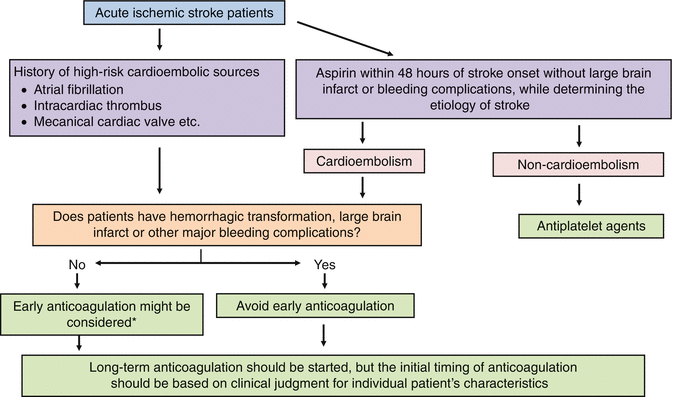Fig. 12.1
The approach to antithrombotic therapy for acute ischemic stroke patients with non-cardioembolic stroke. * Several guidelines suggest that early anticoagulation is not recommended

Fig. 12.2
The approach to antithrombotic therapy for acute ischemic stroke patients with cardioembolic stroke. * Several guidelines suggest that early anticoagulation is not recommended
Conclusions
Aspirin is recommended to use as soon as possible for acute ischemic stroke patients. The CHANCE trial provided the additional evidence that short-term dual antiplatelet therapy (aspirin plus clopidogrel) was safe and superior to aspirin alone in acute ischemic stroke patients. The Platelet-Oriented Inhibition in New TIA and Minor Ischemic Stroke (POINT) trial is currently enrolling North American patients with inclusion or exclusion criteria similar to CHANCE trial. In addition, the Triple Antiplatelets for Reducing Dependency after Ischemic Stroke (TARDIS) trial which is comparing the safety of triple antiplatelet therapy (combined aspirin, clopidogrel, and dipyridamole) versus guideline therapy (aspirin and dipyridamole or clopidogrel alone) in 4100 patients with acute stroke or TIA is ongoing. A conclusive determination of the usefulness of the aggressive short-term combination of antithrombotic agents for the secondary prevention of ischemic stroke in acute stroke settings awaits several large randomized trials.
Suggestions from Clinical Practice Guidelines
Aspirin should be administered orally as early as possible after diagnosis of acute ischemic stroke. Initial aspirin dose depends on various situations and is 160–325 mg per day in most countries. Clopidogrel might be effective, but not fully evaluated in acute stroke setting. Usefulness of urgent anticoagulation is not proven in any cases. However, use of clopidogrel or urgent anticoagulation should be based on individual situations.
References
1.
Lansberg MG, O’Donnell MJ, Khatri P, et al. Antithrombotic and thrombolytic therapy for ischemic stroke: Antithrombotic Therapy and Prevention of Thrombosis, 9th ed: American College of Chest Physicians Evidence-Based Clinical Practice Guidelines. Chest. 2012;141:e601S–36S.CrossrefPubMedPubMedCentral
2.
3.
4.
The International Stroke Trial (IST): a randomised trial of aspirin, subcutaneous heparin, both, or neither among 19435 patients with acute ischaemic stroke. International Stroke Trial Collaborative Group. Lancet. 1997;349:1569–81.
5.
CAST: randomised placebo-controlled trial of early aspirin use in 20,000 patients with acute ischaemic stroke. CAST (Chinese Acute Stroke Trial) Collaborative Group. Lancet. 1997;349:1641–9.
6.
Sandercock PA, Counsell C, Tseng MC, et al. Oral antiplatelet therapy for acute ischaemic stroke. Cochrane Database Syst Rev. 2014;(3):CD000029.
7.
8.
9.
10.
Wong KS, Chen C, Fu J, et al. Clopidogrel plus aspirin versus aspirin alone for reducing embolisation in patients with acute symptomatic cerebral or carotid artery stenosis (CLAIR study): a randomised, open-label, blinded-endpoint trial. Lancet Neurol. 2010;9:489–97.CrossrefPubMed
Stay updated, free articles. Join our Telegram channel

Full access? Get Clinical Tree








